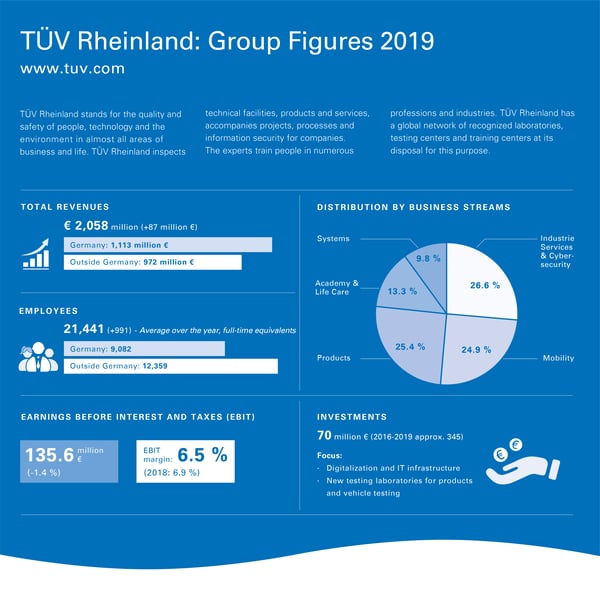 Significant impact on current fiscal year due to Corona-virus pandemic
Significant impact on current fiscal year due to Corona-virus pandemic
TÜV Rheinland continued to grow in the 2019 fiscal year: The international testing service provider’s revenues climbed above the EUR 2 billion mark for the first time, totaling EUR 2.085 billion in the past year. This represents an increase of EUR 87 million, or 4.4%. At EUR 135.6 million, the operating result (EBIT) was slightly lower than in 2018 (EUR 137.5 million). The EBIT margin for the past fiscal year was 6.5%. The number of employees worldwide increased, reaching an average of 21,441 full-time equivalents over the course of 2019. This corresponds to an increase of 991, or 4.8%, relative to the previous year. Investments stood at EUR 70 million.
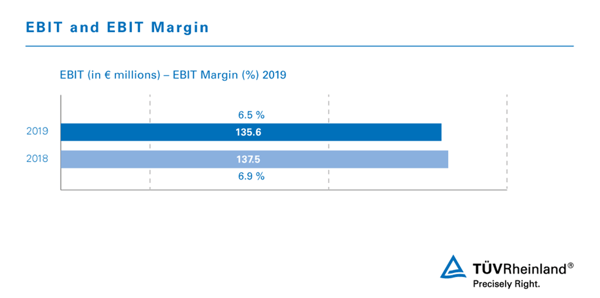 “We are quite satisfied with our revenue growth. In the past years, we were able to increase both sales and earnings. This is also our goal for the coming years after overcoming the Corona crisis,” said Dr. Michael Fübi, CEO of TÜV Rheinland AG, during the presentation of the annual results. Against the backdrop of the current coronavirus pandemic, Dr. Fübi is confident only in the medium term: TÜV Rheinland is currently negatively impacted by the coronavirus crisis in various countries. This is no longer confined to cases where it is not possible to provide services – such as holding in-person seminars at the academy in Germany or for vehicle testing in Spain. Customers in almost all countries and industries are now severely affected by the consequences of the pandemic, so that an overall decline in sales is to be expected. In Germany, the company is using the tool of reduced working hours in several areas for this reason.
“We are quite satisfied with our revenue growth. In the past years, we were able to increase both sales and earnings. This is also our goal for the coming years after overcoming the Corona crisis,” said Dr. Michael Fübi, CEO of TÜV Rheinland AG, during the presentation of the annual results. Against the backdrop of the current coronavirus pandemic, Dr. Fübi is confident only in the medium term: TÜV Rheinland is currently negatively impacted by the coronavirus crisis in various countries. This is no longer confined to cases where it is not possible to provide services – such as holding in-person seminars at the academy in Germany or for vehicle testing in Spain. Customers in almost all countries and industries are now severely affected by the consequences of the pandemic, so that an overall decline in sales is to be expected. In Germany, the company is using the tool of reduced working hours in several areas for this reason.
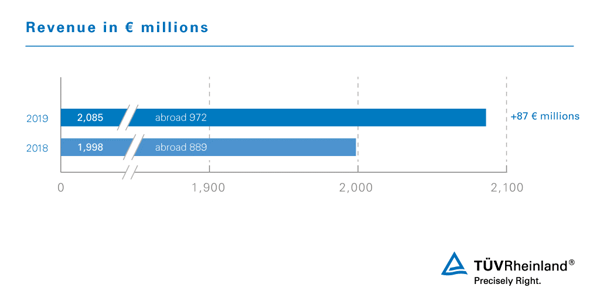 From a mid-term perspective, TÜV Rheinland considers itself very well positioned. Dr. Fübi: “Our business model is and will remain compelling: As TÜV Rheinland, we serve as a guarantor for quality and safety. Suspending safety-related tests for several weeks is understandable and acceptable. However, going without testing indefinitely for industrial systems, power stations, vehicles, IT infrastructure or elevators is not an option. Many of our services are relevant to our lives and our economy. The present crisis can do nothing to change this.”
From a mid-term perspective, TÜV Rheinland considers itself very well positioned. Dr. Fübi: “Our business model is and will remain compelling: As TÜV Rheinland, we serve as a guarantor for quality and safety. Suspending safety-related tests for several weeks is understandable and acceptable. However, going without testing indefinitely for industrial systems, power stations, vehicles, IT infrastructure or elevators is not an option. Many of our services are relevant to our lives and our economy. The present crisis can do nothing to change this.”
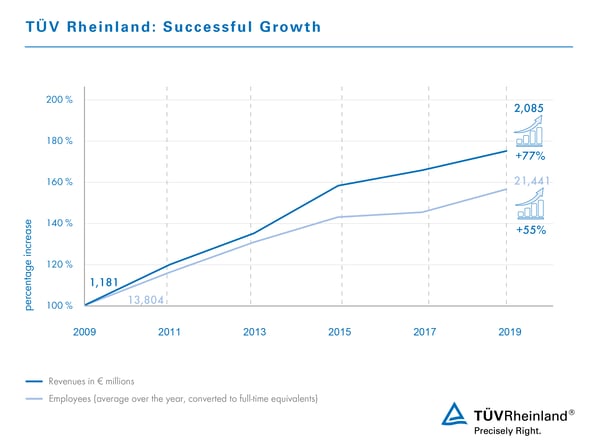 Financial Position and Investments
Financial Position and Investments
TÜV Rheinland’s equity increased by EUR 5.3 million from EUR 412.2 million to EUR 417.5 million in 2019. Positive cash flow from operating activities totaled EUR 221.1 million in the 2019 fiscal year (2018: EUR 183 million).
Investments, not including company acquisitions, stood at EUR 70 million in 2019. These investments focused on various software and digitization projects, the expansion of testing capacity and the expansion and modernization of testing laboratories. TÜV Rheinland invested more than EUR 11 million in equipping the worldwide testing network with wireless communication technology.
Performance in Germany and Internationally
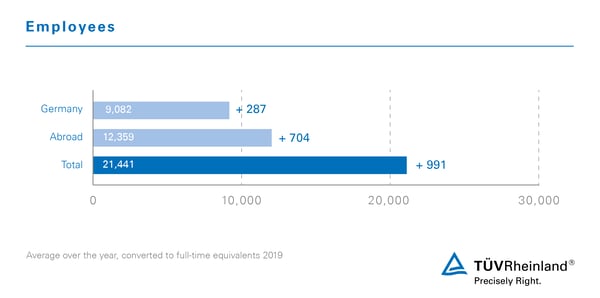 The German home market accounted for 53.4% of TÜV Rheinland’s total revenues in 2019, with the other regions contributing 46.6% accordingly. Revenues in Germany grew by EUR 4 million, totaling EUR 1.113 billion in 2019. Outside of Germany, revenues for 2019 developed more rapidly than in previous years, reaching EUR 972 compared with EUR 889 million in 2018. As in the past, the Greater China region accounted for the largest share of international business and contributed roughly 17% of the Group's total revenues. The India, Middle East and Africa region once again registered particularly strong revenue growth in 2019.
The German home market accounted for 53.4% of TÜV Rheinland’s total revenues in 2019, with the other regions contributing 46.6% accordingly. Revenues in Germany grew by EUR 4 million, totaling EUR 1.113 billion in 2019. Outside of Germany, revenues for 2019 developed more rapidly than in previous years, reaching EUR 972 compared with EUR 889 million in 2018. As in the past, the Greater China region accounted for the largest share of international business and contributed roughly 17% of the Group's total revenues. The India, Middle East and Africa region once again registered particularly strong revenue growth in 2019.
The company's internationality is also reflected by its employees: in 2019, 57.5% of the company's 21,441 employees were based outside of Germany. In Germany, TÜV Rheinland employed an annual average of 9,082 full-time equivalents in 2019, just under 290 more employees than in the previous year. Outside of Germany, the number of employees increased by 700 to a current total of 12,359.
Development of Business Streams
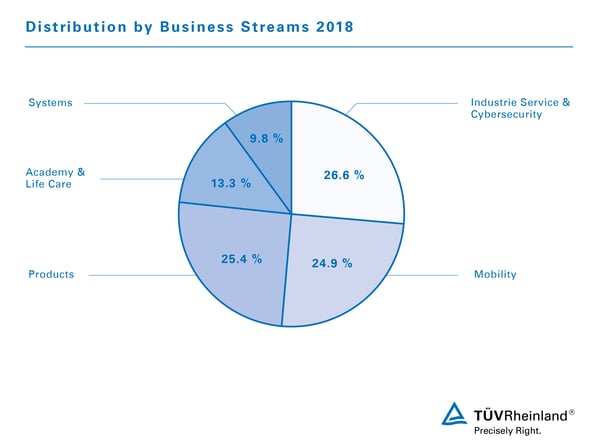
Since the beginning of this year, TÜV Rheinland has divided its global testing and certification business into five business streams. The Cybersecurity business, which was previously operated in the former business stream Digital Transformation & Cybersecurity, has now been integrated into the Industrial Services business stream. The background for this decision is the fact that networked production facilities are increasingly being targeted by attacks, often with severe economic consequences. Under the new structure, TÜV Rheinland is even more efficiently combining expertise in the functional safety of industrial systems with the knowledge and experience of more than 600 cybersecurity specialists worldwide. This newly-created Industrial Services & Cybersecurity business stream made the largest contribution to revenue in 2019 with roughly EUR 597.5 million, representing revenue growth of EUR 32 million. Outstanding performance was recorded in areas such as the inspection of industrial plants. TÜV Rheinland also recorded substantially higher revenues from inspection and certification for electrical engineering and building technology. Internationally, momentum for growth came from the Greater China and Asia-Pacific regions in particular.
In the Mobility business stream, revenues increased by EUR 27 million to reach a total of EUR 558.9 million in 2019. TÜV Rheinland conducts vehicle inspections in Germany, France, Spain, Latvia and Chile. In Spain, the company significantly expanded its network of stations for periodical technical inspections of vehicles through the acquisition of Certio in summer 2019 with twelve additional inspection stations in Catalonia and on Menorca.
The revenue trend in Product Testing, the second-largest business stream, was good once again in 2019. Revenues in this area totaled EUR 570.1 million, corresponding to revenue growth of 5.5% or just under EUR 30 million. This increase is attributable to factors including excellent revenue performance in China and the Asia-Pacific region.
Following internal restructuring, the Academy & Life Care business stream now also encompasses the guidance of companies and organizations into the digital future – the key word here being digital transformation. Viewed according to the previous structure, revenues increased by just under EUR 24 million in 2019 to reach a total of EUR 250 million; under the new structure, the business stream generated overall revenues of EUR 298.3 million. The training and education business in Germany registered strong growth once again.
The Systems business stream including the certification of management systems generated revenues of EUR 221.1 million in 2019, an increase of 4.2%. In this area, good performance was recorded in the business from audits of suppliers on behalf of major customers, known as supply chain audits. This is also one of the strategic growth areas of TÜV Rheinland.
Importance of Safety in Everyday Life Increases
It is not yet possible to accurately measure the extent of the coronavirus pandemic's impact on the business of TÜV Rheinland in 2020. Two trends important for TÜV Rheinland are foreseeable. One is digitalization, which is advancing significantly in business and society at an international level due to the current pandemic. TÜV Rheinland has already invested heavily in digitalization in past years, particularly in the area of developing relevant services and solutions for companies and customers. An additional EUR 15 million were invested in future-oriented subjects and digitalization in 2019, in particular in the implementation of One SAP on HANA, the largest IT project in recent decades.
Significant investments were also made to establish a new digital platform for customers in the Products business stream. Services in the area of professional qualifications, continuing education and seminars will increasingly be provided via e-learning courses or in the TÜV Rheinland “virtual Academy”. For audits and upcoming tests, TÜV Rheinland has developed remote audits wherever possible in coordination with regulatory authorities and customers and is carrying these out. The motivation for these measures is that TÜV Rheinland anticipates that certain areas of business and working life will be permanently changed by the coronavirus pandemic, and that there is no going back to the old “normal”.
Dr. Michael Fübi believes that an additional effect of the coronavirus crisis lies in the perception of safety: “I am convinced that safety remains a basic human need. In fact, I imagine that our view of safety will change. What do I mean by that? It is well possible that, after the crisis, everyone of us will put on our ‘TÜV glasses’ in everyday life more than before. To put it another way, the crisis is increasing awareness of health and safety in everyday life.”
A current representative survey by Civey confirms this assessment: On behalf of TÜV Rheinland, the Berlin-based opinion research institute asked 2,500 people in Germany in mid-April 2020 how the coronavirus pandemic has affected their personal views of the importance of independent safety testing. 26.9% of survey participants stated that the importance of safety had increased for them; 62% reported that it was unchanged, and it decreased for 11.2% of respondents.
Sustainability Remains a Global Challenge
In the medium term, TÜV Rheinland also assumes that other global developments that have been pushed somewhat out of public attention currently will move more sharply into focus again. This particularly includes the major topic of sustainability. Dr. Fübi: “Sustainability is much more than just climate and global warming, even if the climate crisis will not disappear because of Corona. Above all, sustainable supply chains are a prerequisite for a changed sustainable economy. The massive collapse of the global economy is expected to cost more than a hundred million jobs worldwide. Against this backdrop, it will be very important to promote sustainability if, at the same time, millions of new jobs have to be created, especially in emerging markets. Preserving ecosystems remains one of humanity’s greatest challenges. Our sector of testing service providers, the TIC industry, is called upon to make its contribution to this. This corresponds exactly to our mission statement: We firmly believe that social and technological progress are inextricably linked, and that technology must benefit humanity. A fundamental prerequisite for this is safety, which is the top priority of TÜV Rheinland today and will remain so in the future.”


